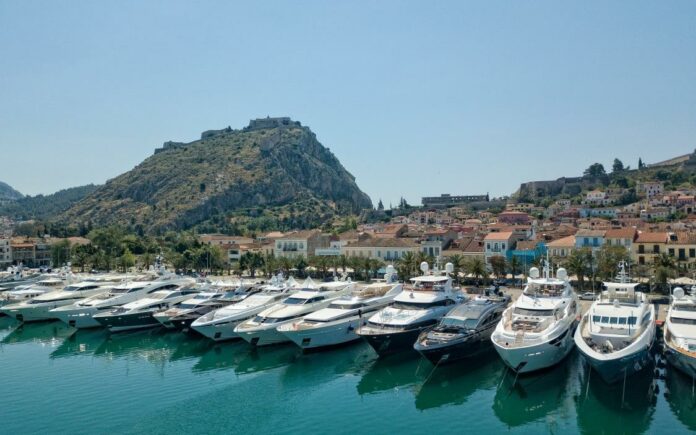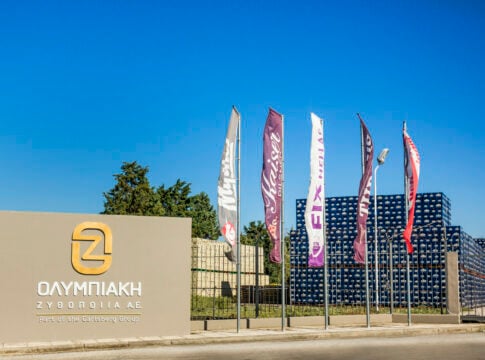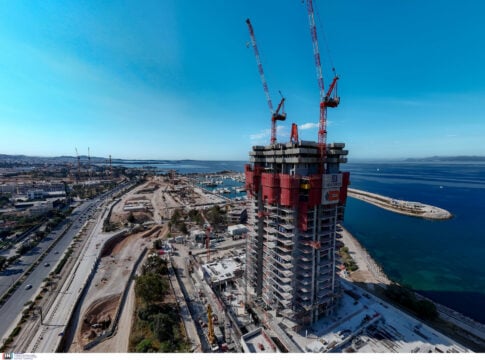By A. Tsimplakis
Fully liberalizing the Greek professional yachting and pleasure craft sector in order to attract international investment, multiply cruises and add more such vessels plying the country’s waters dominated deliberations on the sidelines of the 17th East Med Yacht Show, which took place over the weekend at the Zeas Marina in Piraeus.
The current period, by all accounts, finds all interested commercial parties – vessel owners, marinas, agents – at the “negotiating table” with state authorities, with the aim to remove the last bureaucratic obstacles standing in the way of a full liberalization.
According to sources that spoke with “N”, efforts to alter the current framework have nevertheless stalled.
At present, all sides agree on the need to eliminate illegal charter leases and contracts – i.e. foreign-flagged vessels with non-EU crew-members conducting point-to-point cruises, or foreign-flagged yachts leased to holiday-makers with transactions conducted overseas.
One concern repeatedly aired at the weekend event, however, was that vessel owners and agents who have operated for decades in an “underground” economy will find it very difficult to adapt to a legal framework, even with a minimum tax burden.
On their part, tour agents claimed that large-scale “organized” under-the-table cruises are not an issue, as vessels flying third country flags (non-EU) will merely stay away from Greek waters as long as the current framework is in place.
Currently, non-EU registered yachts (especially mega-yachts) and other such high-end pleasure craft are prohibited from conducting chartered cruises between Greek destinations, with proponents of a complete abolition of this type of cabotage claiming that the national economy is losing out on tens of millions – if not hundred of millions of euros – in lost revenues.
Sectors directly benefitting from a liberalization would be marinas in Greece – where many vessels would be docked in the off season – suppliers of maritime provisions, repair yards, builders, fuel vendors as well as onshore businesses, such as eateries, shops etc.
Conversely, proponents of more conservative changes in the current framework claim that Greece’s extensive coastline, numerous islands and insular nature are unique in the EU. The same line of thinking is that several thousand such vessels are currently operated by Greek professionals who pay taxes and social security contributions.
As such, competition should be fair, whereas certain safeguards must remain to encourage Greek-flagged and operated vessels to maintain a robust presence in the Aegean.
Turkish-flagged vessels
Meanwhile, in a related development, sources close to the Greek coast guard told “N” last week that authorities in the eastern Aegean are on alert following reports that scores of Turkish-flagged vessels – after changing their security status – will again aim to take a significant “slice” of the specific tourism sector in the Aegean.
As “N” reported in early March 2018, last season’s “safari” by the coast guard to locate such Turkish craft was due to two reasons: the first being that most of the specific Turkish-flagged vessels lacked Paris MOU safety standards for professional vessels. Another reason, according to sector officials, is that cruises were often conducted partially “off-the-books”, with no VAT remittances paid.
The clampdown generated protests by Turkish authorities and reactions by Greek tourism professionals who hire the Turkish-flagged vessels.
According to the honorary president of the Hellenic Professional Yacht Owners Association (EPEST) and sector executive Giorgos Vernikos, Turkish owners subsequently withdrew their vessels from Greek waters.
Nevertheless, he and other market watchers who spoke with “N” said Turkish authorities studied the problem and came up with a way around the “safety standards” obstacle, telling owners to return whatever safety certificates they have to the Turkish state and instead change the designation of the vessels to the “primitive” category, which means they would not fall under the Paris MOU’s domain.














